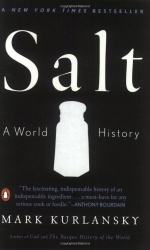|
This section contains 523 words (approx. 2 pages at 400 words per page) |

|
Salt: A World History Summary & Study Guide Description
Salt: A World History Summary & Study Guide includes comprehensive information and analysis to help you understand the book. This study guide contains the following sections:
This detailed literature summary also contains Topics for Discussion and a Free Quiz on Salt: A World History by Mark Kurlansky.
Salt is the history of the world told from the point of view of the only rock that we eat, which is salt. The scope of this book is epic in that it starts at the beginning of recorded world history and ends at roughly present day times.
The first several chapters in the first section of the book deal with the procurement and use of salt in the ancient world. The Chinese and the Egyptians were the first to use salt on a large scale. The Egyptians collected evaporated salt from the sea and the Nile and they used the salt in their food as well as an essential ingredient in preserving the body during mummification. The Chinese used evaporated salt to salt fish and to create a condiment that we still use, soy sauce. It was the Romans though, with their fish based diet that really used salt extensively in their cuisine. One of the most popular Roman sauces, garum, was made from fermented fish in a brine sauce. They used this sauce on everything and salt became an important resource. Our words "salary" and "salad" are both derived from Latin words. Sometimes Roman soldiers were paid in salt, hence "salary" and a "salad" is a collection of vegetables that is doused in a brine sauce before eating.
The next several chapters deal with the importance of salt in Christian Europe during the middle Ages and into the Early Modern period. Salt was important to the early Gauls and Celts who lived in Europe before the Roman conquests and these people found and worked elaborate salt mines. In Catholic Europe, the church had placed certain dietary restriction forbidding meat on Fridays and church holidays. This created an enormous market for fish. Before refrigeration, the only way to package and transport fish was through salting. Cod, the perfect fish for salting, was discovered around this time and became an enormous culinary hit in Europe. The cod trade powered the English and northern European economies and it was the search for cod that eventually led explorers to North America.
In America, the cod industry put strains on the relationship of the colonists to Britain, leading to the American Revolution. The revolution itself was endangered by the shortages of salt in the colonies. In France, the hated "gabelle" tax on salt put pressures on the people and symbolized the injustice of the French government, eventually leading to the French Revolution. In India, in the early 20th century, a reformer named Gandhi led his followers on a long march across the country to protest the oppressive British salt restrictions. This march was the spark that led to Indian independence.
In the 18th and 19th centuries as chemical and technical expertise increased, scientist eventually discovered how to synthesize salt and to improve the technique of making salt. Eventually, American manufacturer Morton's began producing and transporting salt at a rate almost no one could compete with making them the largest salt manufacturers in the world. Much of the historic struggle to find salt is no reduced to a cheap trip to the supermarket.
Read more from the Study Guide
|
This section contains 523 words (approx. 2 pages at 400 words per page) |

|



